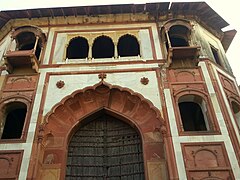Zafar Mahal (Mehrauli)
| Zafar Mahal | |
|---|---|

Zafar Gate of Zafar Mahal
|
|
|
Location within India
|
|
| General information | |
| Architectural style | Mughal Architecture |
| Town or city | Delhi |
| Country | India |
| Coordinates | 28°30′57″N 77°10′39″E / 28.5158°N 77.1775°E |
| Completed | 19th century |
| Demolished | Ruins |
| Client | Mughal Dynasty |
| Design and construction | |
| Architect | Akbar Shah II and Bahadur Shah Zafar II |
Zafar Mahal, in Mehrauli village, in South Delhi, India is considered the last monumental structure built as a summer palace during the fading years of the Mughal era. The building has two components namely, the Mahal or the palace, which was built first by Akbar Shah II in the 18th century, and the entrance gate that was reconstructed in the 19th century by Bahadur Shah Zafar II, popularly known as “Zafar” (the nom de plume of Bahadur Shah II) meaning ‘Victory’. It has a forlorn history because Bahadur Shah Zafar who wished to be buried in the precincts of the Zafar Mahal (palace) and the famous Dargah of Khwaja Qutubuddin Bakhtiar Kaki in Mehrauli, Delhi, but deported by the British to Rangoon, after the First War of Indian Independence in 1857, where he died of old age without any honour.
Zafar Mahal, is the ruined summer palace of the last Mughal Emperor, Bahadur Shah Zafar II. The Moghul Dynasty, which started with the first Mughal Emperor Babur who conquered Delhi in 1526 AD ended after 332 years when on October 7, 1858 the last Emperor Bahdaur Shah Zafar II (1837–1857) was tried for treason by the British and deported to Rangoon, Burma, now Myanmar from the imperial city of Delhi. The irony of this history is also that he travelled in a bullock cart, with a group of British Lancers escorting him.
The graves in Mehrauli in the precincts of Zafar Mahal, built within a marble screen enclosure by Jahandar Shah for his father Bahadur Shah I and others who followed, is a minor reflection of the history of the place. Shah Alam II who had the misfortune of being blinded by Ghulam Qadir, the Rohilla leader was buried here. He was considered a "puppet ruler", first under the Marathas and later under the British. His son Akbar Shah II was also buried here. Mirza Fakruddin son of the last emperor Bahadur Shah Zafar, who died early ushered the end of the Moghul regime, was also buried here. But Bahadur Shah Zafar who had identified the location for his grave (sardgha – the vacant land for burial) was the most unfortunate (ill fated) as he was deported to Rangoon and was buried there.
...
Wikipedia

